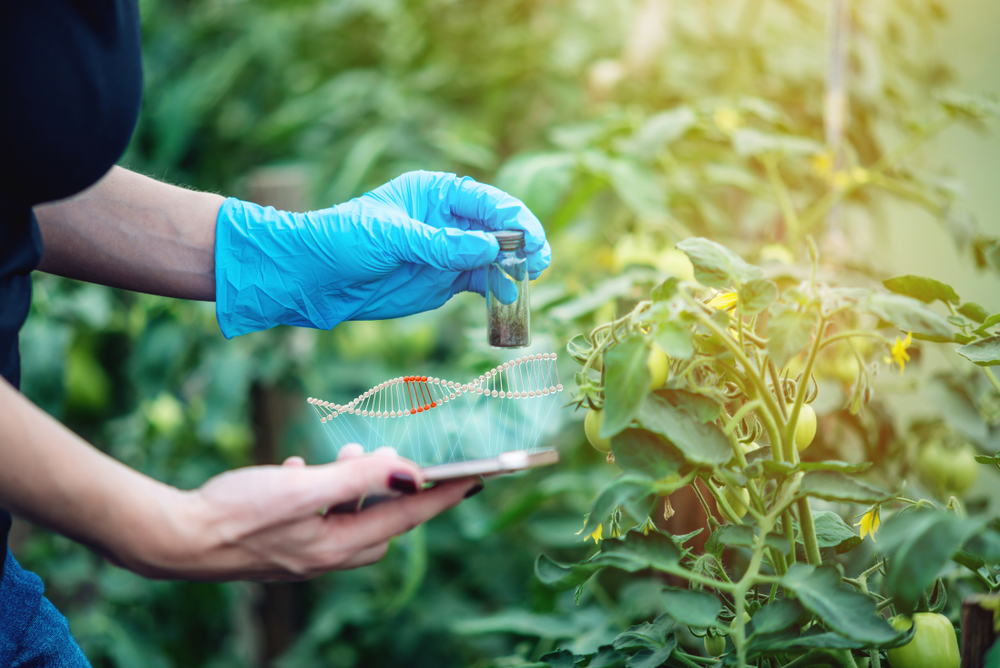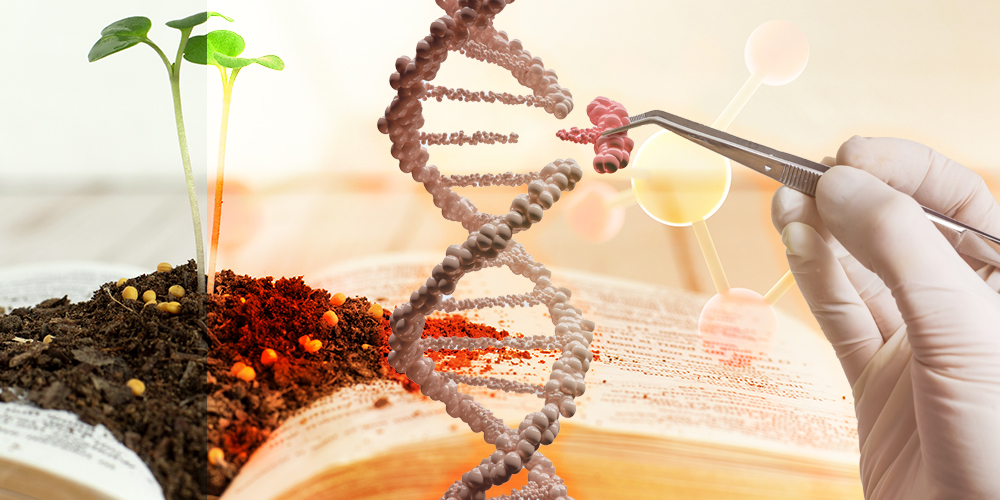How tinkering with plant genetics could lead to devastating human health and ecological consequences as genetic engineers eliminate plants’ ability to cry for help. Action Alert
THE TOPLINE
- Genetic modifications to plants, such as making mustard greens less bitter, could remove beneficial mustard oils known for their anti-cancer properties. This could negatively impact both human health and the plant’s natural defense mechanisms, potentially leading to increased pesticide use.
- Gene-edited foods often bypass more stringent GMO regulations due to their classification. This lack of rigorous oversight means potential health and environmental risks are not adequately addressed, and unknown compounds resulting from genetic modifications may pose unforeseen dangers.
- Modifying plants genetically can disrupt ecological systems that have evolved over millennia. The removal of certain compounds might hinder plants’ ability to attract natural pest predators, potentially altering the balance of ecosystems and increasing reliance on chemical interventions.
Are you OK with being treated like a lab rat? At ANH, we’re not!
This month, a biotech start-up, Pairwise, is teaming up with Bayer to roll out a new type of mustard green engineered to be less bitter than the original plant. The vegetable is set to be the first Crispr-edited food to hit the US market. Just as meatless meat companies are using climate change to push their agenda, we’re told that altering plants’ genetics to make fruits and vegetables more palatable will revolutionize public health by encouraging us to eat more salads. And it’s not just mustard greens; the company is using Crispr to develop seedless blackberries and pitless cherries.
As we’ve been arguing for some time, there are significant concerns that need to be addressed with this new generation of genetically modified foods…but those concerns are being ignored by federal agencies that seem content to close their eyes and allow the biotech industry to treat us like guinea pigs in a massive, open-air experiment. We cannot let it continue.
The illusion of bioequivalence
Technically, the new mustard greens aren’t classified as GMOs because the changes, they tell us, could have been made to occur through traditional breeding methods. This distinction allows gene-edited foods to bypass the more stringent (but still inadequate) regulations that earlier GMOs like Roundup Ready soy and corn must follow.
But just because a food could theoretically be produced by natural means doesn’t guarantee it’s safe. Take the example of Bored Cow, an animal-free dairy milk made through synthetic biology. Independent testing found 92 unknown compounds in this synbio milk, highlighting that even slight genetic modifications can lead to the production of completely novel substances.
These unknown compounds can have significant health implications. Just as synbio milk isn’t truly equivalent to cow’s milk, and cultured meat products aren’t the same as real meat, gene-edited mustard greens are not going to be bioequivalent to traditional mustard greens. That’s because the natural greens are packed with cancer-fighting compounds that, on a farm, act as a natural control system by calling in predators and parasitoids that regulate pests, minimizing the need for pesticides. We cannot assume that these new plants are safe based on the limited scope of current regulatory frameworks, and we may well find that new plants demand the use of more pesticides because the gene-editing has interfered with the plant’s natural control system.
Small change, big consequences
Presumably, Pairwise wants us to believe that going in and making one small genetic change to remove a compound that makes mustard greens bitter will have no other effect on the plant’s biology other than taste. But there are very good reasons to believe that is not the case, and that even small genetic changes to plants can have profound consequences for ecological systems that have evolved over millennia.

Consider the following. Glucosinolates are what cause mustard greens to be bitter. They have been studied for their anti-cancer properties, and indeed, high consumption of mustard greens and other brassicas have been linked to reduced risk of lung, stomach, colon, rectal, prostatic, endometrial and ovarian cancers. If these are the compounds that Pairwise is removing, they are removing some of the most health-promoting, disease-fighting aspects of eating mustard greens.
But there are even wider implications. Plants have evolved sophisticated ways to “cry for help” by releasing smells that attract natural enemies of the insects or pests that are attacking them. These smells can attract helpful insects that eat the pests or their eggs, and even birds that eat insects. Plants can also communicate with each other using these smells, warning neighboring plants about the danger. This means plants are very aware of what’s happening around them and can react quickly to threats.
By removing or reducing levels of glucosinolates, that are broken down to volatile mustard oils (isothiocyanates) by the action of an enzyme produced when the plant is stressed, for example following attack by herbivorous insect pests, the plant’s ability to “call for help” in this way will be compromised, potentially seriously. Pairwise and companies like them are tinkering with powerful forces that can have dramatic consequences. For example, if removing certain bitter compounds impairs the plant’s ability to “cry for help,” this could lead growers to use more pesticides to compensate. Unfortunately, these considerations are completely ignored by federal agencies.
Safety concerns and regulatory gaps
The US Department of Agriculture (USDA) and the Food and Drug Administration (FDA) review gene-edited foods to ensure they don’t pose a pest risk or significant health hazards. Pairwise’s mustard greens passed these reviews and were deemed not to be plant pests. However, these assessments are often based on the assumption that gene-edited foods are bioequivalent to their natural counterparts. This assumption is problematic for the reasons discussed above.
Agencies also seem unconcerned with emerging data suggesting that the precision of gene-editing technologies like Crispr is overstated. Even small unintended changes in the DNA can have unpredictable effects on the plant’s nutritional profile and its interaction with the environment. These unintended changes might introduce new allergens or toxins that were not present in the original plant. Again, because agencies believe these gene-edited foods to be “bioequivalent” to their natural counterparts, there is almost no examination of these safety or environmental issues.
While the promise of more palatable mustard greens and other gene-edited foods might appeal to consumers looking for convenient and nutritious options, it’s essential to remain cautious. The regulatory framework in the US is not equipped to handle the unique challenges posed by gene-editing technologies. As consumers, we must demand greater transparency and more rigorous safety testing for these novel foods.
Until then, agencies must be pushed to question the bioequivalence of gene-edited foods and consider the potential risks they pose to our health and the environment. The convenience of a less bitter mustard green is not worth the unknown dangers lurking behind this untested technology.
There is of course another strategy other than Crispr: What about helping children to better adapt to bitterness in foods so that we can raise populations that are less susceptible to cancer and better able to cope with our increasingly toxic world?
At ANH, this is what we advocate, along with taking extracts of brassicas that are rich in glucosinolates, sulforaphane and other powerful, bioactive compounds that are both cancer protective and support detoxification.
Action Alert! Write to Congress and the FDA, telling them that we need more testing of gene-edited foods that research is increasingly finding are not bioequivalent to traditional foods. Please send your message immediately.





Seeing as though most people do not eat mustard greens on a regular basis, they don’t get much exposure to the glucosinolates in question. Mustards have value in terms of other nutrients that are higher than lettuce, etc., so if folks eat more because they are not bitter, then we have a net gain in nutritoin. We also know that glucosinoltes vary in abundance because of environmental conditions, certain ones decrease after harvest, and not all are anti-cancer. Some have been implicated with negative outcomes. My feeling as a scientist married to a farmer (that grows mustard greens) is that if people can be compelled to enjoy more fruits and vegetables with a simple, safe genetic tweak, then that’s a good thing. Humans have been doing that through breeding and selection for 10,000 years, this process is just more precise and rapid.
Small local farm’s are increasingly going towards regenerative farming methods in order to increase the soil microbiome which creates healthy soil and plants as well. The no-till method of farming not only increases water retention as well as improved soil heath. It, also cuts costs due the improved fertility without the need for artificial fertilizers. Saving farmers money.